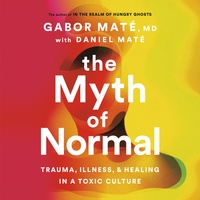You need to sign in or sign up before continuing.
Take a photo of a barcode or cover
informative
inspiring
reflective
medium-paced
Different than what I expected based on the title, but I did enjoy this book. Gave a lot to chew on.
It was sudden. The first 30+ pages have some incredibly compassionate, nuanced and yet clear, and important illustrations of trauma, how it can work, how you might recognize its impact. But I have little tolerance for psychotherapists proclaiming simple, generalizable narratives about trauma from single human stories. This isn’t the first time Maté’s writing takes this stance, but it was blessedly absent as I got through the first 30 pages. I was really hopeful the entire book would preserve this attention and respect for the complexity of human story.
But then it came. First one “analysis”, almost off the cuff and in fairly clear contradiction to the person whose story was being recounted: “This man’s impulse to protect his mother was not a defense against anything I had said or implied but against his own unacknowledged anger” (p.30). I wonder how “this man” felt (or was made to feel) about being described in this way?
Then again, as a general proclamation about human psychology and its rootedness in trauma: “Nobody is born with such traits [superautonomous self-sufficiency]. They invariably stem from coping reactions to developmental trauma” (p. 38). If you grasp the subtlety of his statement about big vs little “-t” “trauma,” you can read this sentence with a bit more nuance. And yet the word “trauma” packs a cultural punch that overwhelms such nuance, especially when used by a psychotherapist as a way to interpret someone’s psychology. #Unhelpful.
It’s not that his analysis is “wrong” — it’s that it’s presented as simple fact (either right or wrong) rather than as a complex frame for additional insight, curiosity, or learning. Given the author’s position of power and influence over those with whom he works, this level of disrespectful arrogance deserves to be named and called out. The time of therapists proclaiming their own insights about their “patients” is long over.
But then it came. First one “analysis”, almost off the cuff and in fairly clear contradiction to the person whose story was being recounted: “This man’s impulse to protect his mother was not a defense against anything I had said or implied but against his own unacknowledged anger” (p.30). I wonder how “this man” felt (or was made to feel) about being described in this way?
Then again, as a general proclamation about human psychology and its rootedness in trauma: “Nobody is born with such traits [superautonomous self-sufficiency]. They invariably stem from coping reactions to developmental trauma” (p. 38). If you grasp the subtlety of his statement about big vs little “-t” “trauma,” you can read this sentence with a bit more nuance. And yet the word “trauma” packs a cultural punch that overwhelms such nuance, especially when used by a psychotherapist as a way to interpret someone’s psychology. #Unhelpful.
It’s not that his analysis is “wrong” — it’s that it’s presented as simple fact (either right or wrong) rather than as a complex frame for additional insight, curiosity, or learning. Given the author’s position of power and influence over those with whom he works, this level of disrespectful arrogance deserves to be named and called out. The time of therapists proclaiming their own insights about their “patients” is long over.
informative
reflective
slow-paced
informative
slow-paced
honestly this book is a mess in a lot of ways like
i do not like the way the author talks abt disability as this massive tragedy and the worst thing that could have happened to a person while simultaneously shunning anyone who has made peace with their disability. it s fucking weird.
I think another aspect that maybe weirds me out a lot as well is that there are a lot of really good points in this regarding the impact on immune system that repressing one’s emotions is and how he talks about addiction and societal influence into this and the spiritual part of self that also needs tending to.
i do not like the way the author talks abt disability as this massive tragedy and the worst thing that could have happened to a person while simultaneously shunning anyone who has made peace with their disability. it s fucking weird.
I think another aspect that maybe weirds me out a lot as well is that there are a lot of really good points in this regarding the impact on immune system that repressing one’s emotions is and how he talks about addiction and societal influence into this and the spiritual part of self that also needs tending to.
This book is phenomenal. I learnt the lessons that I somehow felt existed within me but I could never describe them in words. Human pain and suffering is one thing. It was in no time when I was finished with the book. As a fellow human being, my thoughts and mind dynamics match with the people mentioned in the book. It was so relatable and eye opening, the reality of society and human psychology. I wouldn't say I've experienced all scenarios but yes most of them if not experienced atleast I've thought about them. It was a fantastic read.
I tried to give it a chance, I really did...
This is not for me, my perspectives to not align with the author's.
And no, ADHD is not a "mental disease".
This is not for me, my perspectives to not align with the author's.
And no, ADHD is not a "mental disease".
challenging
emotional
informative
reflective
slow-paced
challenging
hopeful
informative
inspiring
slow-paced
Agreed with him up until he called for a trauma-informed carceral system (if you care about a trauma-informed society, dismantle the carceral state!).







